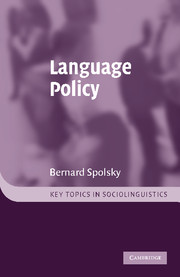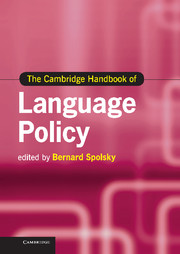Language Policy
The volume brings together leading experts from a range of disciplines to create a broad perspective on the study of style and variation in spoken language. The book discusses key approaches to stylistic variation, including such issues as attention paid to speech, audience design, identity construction, the corpus study of register, genre, distinctiveness and the anthropological study of style. Rigorous and engaging, this book will become the standard work on stylistic variation. It will be welcomed by students and academics in sociolinguistics, English language, dialectology, anthropology and sociology.
- Proposes a theory of, and identifies the principal forces affecting, language policy
- Bases its theory on the analysis of a very wide range of national and local policies
- Deals with a wide range of issues, such as the complexity of US policy, the growth of human and civil rights, the movement to preserve endangered languages, and the call for linguistic purity
Reviews & endorsements
"It is one of the virtues of this book that what one author suggests or asserts may be supplemented or argued with by another. Reading these papers is therefore not unlike attending a thoughtful debate carried on by experts...it is a rigorous and well-referenced (there is a 32-page bibliography) exploration of style from a variety of perspectives. In addition, the work provides fascinating critiques of the many viewpoints presented during the workshop." Journal of Multilingual and Multicultural Development
"Taking into account this gathering of refined versions of classical approaches to style with others completely new perspectives on the one hand, and the extensive reflections on each of these that other experts offer, the book constitutes an excellent up to date of research into the role of style in sociolinguistic variation and represents a serious attempt to solve the problems that its analysis poses. The collection is a fundamental reference, therefore, for students and academics whose works have to deal more or less directly with the complex but at the same time fascinating task of interpreting stylistic variation in speech." Estudios de Sociolinguistica Virginia Acuna Ferreira, Universidade de Vigo
Product details
March 2011Adobe eBook Reader
9780511839870
0 pages
0kg
4 tables
This ISBN is for an eBook version which is distributed on our behalf by a third party.
Table of Contents
- 1. Language practices, ideology and beliefs, and management and planning
- 2. Driving out the bad
- 3. Pursuing the good and dealing with the new
- 4. The nature of language policy and its domains
- 5. Two monolingual polities - Iceland and France
- 6. How did English spread?
- 7. Does the US have a language policy or just civil rights?
- 8. Language rights
- 9. Monolingual polities under pressure
- 10. Monolingual polities with recognised linguistic minorities
- 11. Partitioning language space - two, three, many
- 12. Resisting language shift
- 13. Conclusions.









